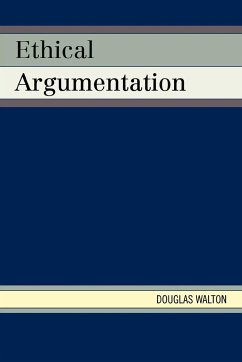Douglas Walton
Ethical Argumentation
Douglas Walton
Ethical Argumentation
- Broschiertes Buch
- Merkliste
- Auf die Merkliste
- Bewerten Bewerten
- Teilen
- Produkt teilen
- Produkterinnerung
- Produkterinnerung
Bridging the gap between applied ethics and ethical theory, Ethical Argumentation draws on recent research in argumentation theory to develop a more realistic model of how ethical justification actually works.
Andere Kunden interessierten sich auch für
![Interests and Epistemic Integrity in Science Interests and Epistemic Integrity in Science]() Jan De WinterInterests and Epistemic Integrity in Science60,99 €
Jan De WinterInterests and Epistemic Integrity in Science60,99 €![Feminist Analyses of Applied Ethics Feminist Analyses of Applied Ethics]() Jane DuranFeminist Analyses of Applied Ethics59,99 €
Jane DuranFeminist Analyses of Applied Ethics59,99 €![CONTEMPORARY APPLIED ETHICS CONTEMPORARY APPLIED ETHICS]() Matthew SadikuCONTEMPORARY APPLIED ETHICS60,99 €
Matthew SadikuCONTEMPORARY APPLIED ETHICS60,99 €![Who Cares About Ethics? Who Cares About Ethics?]() Obiora IkeWho Cares About Ethics?29,99 €
Obiora IkeWho Cares About Ethics?29,99 €![Ethical Dimensions of Global Development Ethical Dimensions of Global Development]() Ethical Dimensions of Global Development40,99 €
Ethical Dimensions of Global Development40,99 €![The Ethical Imagination The Ethical Imagination]() Margaret SomervilleThe Ethical Imagination21,99 €
Margaret SomervilleThe Ethical Imagination21,99 €![Practical Reasoning and Ethical Decision Practical Reasoning and Ethical Decision]() Robert AudiPractical Reasoning and Ethical Decision56,99 €
Robert AudiPractical Reasoning and Ethical Decision56,99 €-
-
-
Bridging the gap between applied ethics and ethical theory, Ethical Argumentation draws on recent research in argumentation theory to develop a more realistic model of how ethical justification actually works.
Hinweis: Dieser Artikel kann nur an eine deutsche Lieferadresse ausgeliefert werden.
Hinweis: Dieser Artikel kann nur an eine deutsche Lieferadresse ausgeliefert werden.
Produktdetails
- Produktdetails
- Verlag: Lexington Books
- Seitenzahl: 330
- Erscheinungstermin: 16. Juli 2009
- Englisch
- Abmessung: 229mm x 152mm x 19mm
- Gewicht: 537g
- ISBN-13: 9780739141380
- ISBN-10: 0739141384
- Artikelnr.: 27875108
- Herstellerkennzeichnung
- Libri GmbH
- Europaallee 1
- 36244 Bad Hersfeld
- gpsr@libri.de
- Verlag: Lexington Books
- Seitenzahl: 330
- Erscheinungstermin: 16. Juli 2009
- Englisch
- Abmessung: 229mm x 152mm x 19mm
- Gewicht: 537g
- ISBN-13: 9780739141380
- ISBN-10: 0739141384
- Artikelnr.: 27875108
- Herstellerkennzeichnung
- Libri GmbH
- Europaallee 1
- 36244 Bad Hersfeld
- gpsr@libri.de
By Douglas Walton
Chapter 1 Introduction Part 2 Fundamentals of Ethical Argumentation Chapter
3 Legal Arguments Chapter 4 Hard Cases and Easy Cases Chapter 5 Ross's
Theory of Ethical Reasoning Chapter 6 Comparison of Ethical and Legal
Arguments Chapter 7 The Problem of Emotive Language Chapter 8 Toward a New
Framework Chapter 9 Aristotle on Endoxic Ethical Justification Chapter 10
Evaluating Ethical Argumentation in a Dialogue Format Chapter 11
Deliberation and Practical Reasoning Chapter 12 Concluding Perspectives
Part 13 The Layered Maieutic Case Study Method Chapter 14 A Case from
Medical Ethics Chapter 15 The Layer of Deliberation Chapter 16 Dialectical
Shifts Chapter 17 The Layer of Critical Discussion Chapter 18 Maieutic
Insight and Commitment Chapter 19 The Case Analysis and Discussion Chapter
20 The Structure of a Layered Case Study Chapter 21 Current Status of
Casuistry in Ethics Chapter 22 How to Evaluate a Layered Case Study Chapter
23 Summary of the Layered Maieutic Case Study Method Part 24 The Central
Characteristics of Ethical Reasoning Chapter 25 The Problem of Circular
Ethical Justification Chapter 26 Ethical and Legal Reasoning Reconsidered
Chapter 27 Chained Inferences in Retrospective Ethical Reasoning Chapter 28
Deep Disagreements and Ultimate Ethical Premises Chapter 29 Facts and
Values in Ethical Reasoning Chapter 30 Abductive Inference Chapter 31
Endoxic Premises Chapter 32 How to Determine Endoxic Premises Chapter 33
Summary of the Structure of Ethical Reasoning Part 34 Persuasive
Definitions Chapter 35 Stevenson's Theory of Persuasive Definitions Chapter
36 Public Policy Implications of Persuasive Definitions Chapter 37
Value-Laden Terms and Moral Persuasion Chapter 38 A Pragmatic Approach to
Definitions Chapter 39 Use of Loaded Terms Chapter 40 The Deceptive Aspect
of Persuasive Definitions Chapter 41 Is There a Fallacy of Loaded Terms?
Chapter 42 How to Evaluate a Persuasive Definition Chapter 43 Uses in Other
Contexts Part 44 Dialectic, Persuasion, and Rhetoric Chapter 45 What is
Dialectic? Chapter 46 The New Dialectic Chapter 47 The General Idea of
Persuasion Dialogue Chapter 48 Critical Discussion and Rational Persuasion
Chapter 49 Fallacies and Faults of Arguments Chapter 50 The Maieutic
Function and Learning What Your Goals Are Chapter 51 The Opposition between
Rhetoric and Dialectic Chapter 52 Persuasion, Action, and Ethical
Justification Chapter 53 A New Program for Studying Ethical Argumentation
Part 54 The Probative Function Chapter 55 The Probative Function and
Circular Arguments Chapter 56 Account of the Probative Function in Sextus
Empiricus Chapter 57 The Problem of Circular Reasoning as Treated in
Ancient Sources Chapter 58 Infinite Regress Arguments Chapter 59 Types of
Arguments Chapter 60 Linked and Convergent Arguments Chapter 61 Chaining of
Arguments Chapter 62 Doubt Reduction and Chaining Chapter 63 The Importance
of the Probative Function Chapter 64 Summary: How the Probative Function
Works Part 65 The New System of Layered Justification Chapter 66 Subjective
and Objective Chapter 67 Attitudes, Emotions, and Rationality Chapter 68
Evidence, Emotion, and Ethical Justification Chapter 69 Emotivism,
Relativism, and Postmodernism Chapter 70 The Dialectical Shift to a Verbal
Dispute Chapter 71 Multiple Definitions of Ethical Terms Chapter 72 An
Argumentation System for Ethical Definitions Chapter 73 The Difference
between Layered Ethical Justification and Propaganda Chapter 74 Summary of
the Argumentation System Chapter 75 The Pragmatic Nature of Ethical
Argumentation
3 Legal Arguments Chapter 4 Hard Cases and Easy Cases Chapter 5 Ross's
Theory of Ethical Reasoning Chapter 6 Comparison of Ethical and Legal
Arguments Chapter 7 The Problem of Emotive Language Chapter 8 Toward a New
Framework Chapter 9 Aristotle on Endoxic Ethical Justification Chapter 10
Evaluating Ethical Argumentation in a Dialogue Format Chapter 11
Deliberation and Practical Reasoning Chapter 12 Concluding Perspectives
Part 13 The Layered Maieutic Case Study Method Chapter 14 A Case from
Medical Ethics Chapter 15 The Layer of Deliberation Chapter 16 Dialectical
Shifts Chapter 17 The Layer of Critical Discussion Chapter 18 Maieutic
Insight and Commitment Chapter 19 The Case Analysis and Discussion Chapter
20 The Structure of a Layered Case Study Chapter 21 Current Status of
Casuistry in Ethics Chapter 22 How to Evaluate a Layered Case Study Chapter
23 Summary of the Layered Maieutic Case Study Method Part 24 The Central
Characteristics of Ethical Reasoning Chapter 25 The Problem of Circular
Ethical Justification Chapter 26 Ethical and Legal Reasoning Reconsidered
Chapter 27 Chained Inferences in Retrospective Ethical Reasoning Chapter 28
Deep Disagreements and Ultimate Ethical Premises Chapter 29 Facts and
Values in Ethical Reasoning Chapter 30 Abductive Inference Chapter 31
Endoxic Premises Chapter 32 How to Determine Endoxic Premises Chapter 33
Summary of the Structure of Ethical Reasoning Part 34 Persuasive
Definitions Chapter 35 Stevenson's Theory of Persuasive Definitions Chapter
36 Public Policy Implications of Persuasive Definitions Chapter 37
Value-Laden Terms and Moral Persuasion Chapter 38 A Pragmatic Approach to
Definitions Chapter 39 Use of Loaded Terms Chapter 40 The Deceptive Aspect
of Persuasive Definitions Chapter 41 Is There a Fallacy of Loaded Terms?
Chapter 42 How to Evaluate a Persuasive Definition Chapter 43 Uses in Other
Contexts Part 44 Dialectic, Persuasion, and Rhetoric Chapter 45 What is
Dialectic? Chapter 46 The New Dialectic Chapter 47 The General Idea of
Persuasion Dialogue Chapter 48 Critical Discussion and Rational Persuasion
Chapter 49 Fallacies and Faults of Arguments Chapter 50 The Maieutic
Function and Learning What Your Goals Are Chapter 51 The Opposition between
Rhetoric and Dialectic Chapter 52 Persuasion, Action, and Ethical
Justification Chapter 53 A New Program for Studying Ethical Argumentation
Part 54 The Probative Function Chapter 55 The Probative Function and
Circular Arguments Chapter 56 Account of the Probative Function in Sextus
Empiricus Chapter 57 The Problem of Circular Reasoning as Treated in
Ancient Sources Chapter 58 Infinite Regress Arguments Chapter 59 Types of
Arguments Chapter 60 Linked and Convergent Arguments Chapter 61 Chaining of
Arguments Chapter 62 Doubt Reduction and Chaining Chapter 63 The Importance
of the Probative Function Chapter 64 Summary: How the Probative Function
Works Part 65 The New System of Layered Justification Chapter 66 Subjective
and Objective Chapter 67 Attitudes, Emotions, and Rationality Chapter 68
Evidence, Emotion, and Ethical Justification Chapter 69 Emotivism,
Relativism, and Postmodernism Chapter 70 The Dialectical Shift to a Verbal
Dispute Chapter 71 Multiple Definitions of Ethical Terms Chapter 72 An
Argumentation System for Ethical Definitions Chapter 73 The Difference
between Layered Ethical Justification and Propaganda Chapter 74 Summary of
the Argumentation System Chapter 75 The Pragmatic Nature of Ethical
Argumentation
Chapter 1 Introduction Part 2 Fundamentals of Ethical Argumentation Chapter
3 Legal Arguments Chapter 4 Hard Cases and Easy Cases Chapter 5 Ross's
Theory of Ethical Reasoning Chapter 6 Comparison of Ethical and Legal
Arguments Chapter 7 The Problem of Emotive Language Chapter 8 Toward a New
Framework Chapter 9 Aristotle on Endoxic Ethical Justification Chapter 10
Evaluating Ethical Argumentation in a Dialogue Format Chapter 11
Deliberation and Practical Reasoning Chapter 12 Concluding Perspectives
Part 13 The Layered Maieutic Case Study Method Chapter 14 A Case from
Medical Ethics Chapter 15 The Layer of Deliberation Chapter 16 Dialectical
Shifts Chapter 17 The Layer of Critical Discussion Chapter 18 Maieutic
Insight and Commitment Chapter 19 The Case Analysis and Discussion Chapter
20 The Structure of a Layered Case Study Chapter 21 Current Status of
Casuistry in Ethics Chapter 22 How to Evaluate a Layered Case Study Chapter
23 Summary of the Layered Maieutic Case Study Method Part 24 The Central
Characteristics of Ethical Reasoning Chapter 25 The Problem of Circular
Ethical Justification Chapter 26 Ethical and Legal Reasoning Reconsidered
Chapter 27 Chained Inferences in Retrospective Ethical Reasoning Chapter 28
Deep Disagreements and Ultimate Ethical Premises Chapter 29 Facts and
Values in Ethical Reasoning Chapter 30 Abductive Inference Chapter 31
Endoxic Premises Chapter 32 How to Determine Endoxic Premises Chapter 33
Summary of the Structure of Ethical Reasoning Part 34 Persuasive
Definitions Chapter 35 Stevenson's Theory of Persuasive Definitions Chapter
36 Public Policy Implications of Persuasive Definitions Chapter 37
Value-Laden Terms and Moral Persuasion Chapter 38 A Pragmatic Approach to
Definitions Chapter 39 Use of Loaded Terms Chapter 40 The Deceptive Aspect
of Persuasive Definitions Chapter 41 Is There a Fallacy of Loaded Terms?
Chapter 42 How to Evaluate a Persuasive Definition Chapter 43 Uses in Other
Contexts Part 44 Dialectic, Persuasion, and Rhetoric Chapter 45 What is
Dialectic? Chapter 46 The New Dialectic Chapter 47 The General Idea of
Persuasion Dialogue Chapter 48 Critical Discussion and Rational Persuasion
Chapter 49 Fallacies and Faults of Arguments Chapter 50 The Maieutic
Function and Learning What Your Goals Are Chapter 51 The Opposition between
Rhetoric and Dialectic Chapter 52 Persuasion, Action, and Ethical
Justification Chapter 53 A New Program for Studying Ethical Argumentation
Part 54 The Probative Function Chapter 55 The Probative Function and
Circular Arguments Chapter 56 Account of the Probative Function in Sextus
Empiricus Chapter 57 The Problem of Circular Reasoning as Treated in
Ancient Sources Chapter 58 Infinite Regress Arguments Chapter 59 Types of
Arguments Chapter 60 Linked and Convergent Arguments Chapter 61 Chaining of
Arguments Chapter 62 Doubt Reduction and Chaining Chapter 63 The Importance
of the Probative Function Chapter 64 Summary: How the Probative Function
Works Part 65 The New System of Layered Justification Chapter 66 Subjective
and Objective Chapter 67 Attitudes, Emotions, and Rationality Chapter 68
Evidence, Emotion, and Ethical Justification Chapter 69 Emotivism,
Relativism, and Postmodernism Chapter 70 The Dialectical Shift to a Verbal
Dispute Chapter 71 Multiple Definitions of Ethical Terms Chapter 72 An
Argumentation System for Ethical Definitions Chapter 73 The Difference
between Layered Ethical Justification and Propaganda Chapter 74 Summary of
the Argumentation System Chapter 75 The Pragmatic Nature of Ethical
Argumentation
3 Legal Arguments Chapter 4 Hard Cases and Easy Cases Chapter 5 Ross's
Theory of Ethical Reasoning Chapter 6 Comparison of Ethical and Legal
Arguments Chapter 7 The Problem of Emotive Language Chapter 8 Toward a New
Framework Chapter 9 Aristotle on Endoxic Ethical Justification Chapter 10
Evaluating Ethical Argumentation in a Dialogue Format Chapter 11
Deliberation and Practical Reasoning Chapter 12 Concluding Perspectives
Part 13 The Layered Maieutic Case Study Method Chapter 14 A Case from
Medical Ethics Chapter 15 The Layer of Deliberation Chapter 16 Dialectical
Shifts Chapter 17 The Layer of Critical Discussion Chapter 18 Maieutic
Insight and Commitment Chapter 19 The Case Analysis and Discussion Chapter
20 The Structure of a Layered Case Study Chapter 21 Current Status of
Casuistry in Ethics Chapter 22 How to Evaluate a Layered Case Study Chapter
23 Summary of the Layered Maieutic Case Study Method Part 24 The Central
Characteristics of Ethical Reasoning Chapter 25 The Problem of Circular
Ethical Justification Chapter 26 Ethical and Legal Reasoning Reconsidered
Chapter 27 Chained Inferences in Retrospective Ethical Reasoning Chapter 28
Deep Disagreements and Ultimate Ethical Premises Chapter 29 Facts and
Values in Ethical Reasoning Chapter 30 Abductive Inference Chapter 31
Endoxic Premises Chapter 32 How to Determine Endoxic Premises Chapter 33
Summary of the Structure of Ethical Reasoning Part 34 Persuasive
Definitions Chapter 35 Stevenson's Theory of Persuasive Definitions Chapter
36 Public Policy Implications of Persuasive Definitions Chapter 37
Value-Laden Terms and Moral Persuasion Chapter 38 A Pragmatic Approach to
Definitions Chapter 39 Use of Loaded Terms Chapter 40 The Deceptive Aspect
of Persuasive Definitions Chapter 41 Is There a Fallacy of Loaded Terms?
Chapter 42 How to Evaluate a Persuasive Definition Chapter 43 Uses in Other
Contexts Part 44 Dialectic, Persuasion, and Rhetoric Chapter 45 What is
Dialectic? Chapter 46 The New Dialectic Chapter 47 The General Idea of
Persuasion Dialogue Chapter 48 Critical Discussion and Rational Persuasion
Chapter 49 Fallacies and Faults of Arguments Chapter 50 The Maieutic
Function and Learning What Your Goals Are Chapter 51 The Opposition between
Rhetoric and Dialectic Chapter 52 Persuasion, Action, and Ethical
Justification Chapter 53 A New Program for Studying Ethical Argumentation
Part 54 The Probative Function Chapter 55 The Probative Function and
Circular Arguments Chapter 56 Account of the Probative Function in Sextus
Empiricus Chapter 57 The Problem of Circular Reasoning as Treated in
Ancient Sources Chapter 58 Infinite Regress Arguments Chapter 59 Types of
Arguments Chapter 60 Linked and Convergent Arguments Chapter 61 Chaining of
Arguments Chapter 62 Doubt Reduction and Chaining Chapter 63 The Importance
of the Probative Function Chapter 64 Summary: How the Probative Function
Works Part 65 The New System of Layered Justification Chapter 66 Subjective
and Objective Chapter 67 Attitudes, Emotions, and Rationality Chapter 68
Evidence, Emotion, and Ethical Justification Chapter 69 Emotivism,
Relativism, and Postmodernism Chapter 70 The Dialectical Shift to a Verbal
Dispute Chapter 71 Multiple Definitions of Ethical Terms Chapter 72 An
Argumentation System for Ethical Definitions Chapter 73 The Difference
between Layered Ethical Justification and Propaganda Chapter 74 Summary of
the Argumentation System Chapter 75 The Pragmatic Nature of Ethical
Argumentation








